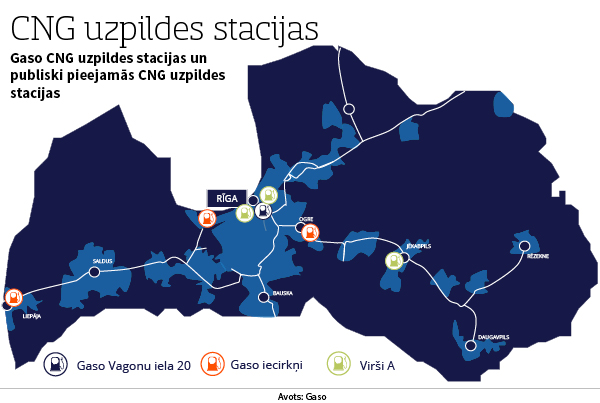Cars in Latvia are destined for destruction

If the European Union lasts for ten more years, it will manage to destroy petrol and diesel cars in its territory.
The European Commission and the European Parliament are currently competing to announce greater reductions in CO2 emissions over the next 10 years. The EP is estimated to have surpassed the EC's modest -55% with -60%, but both of these indicators significantly exceed the -40% announced a few years ago, which Latvia has entered in its regulatory enactments, which must now be rewritten.
Green math is a nightmare
The figures announced in Brussels are absurd. According to the "green" dogmatics, CO2 emitted from the burning of wood is not CO2 and has no effect on global warming, the fight against which has been declared the cause of all these measures. By that logic, global warming can be halted by cutting down all the world's forests and burning their wood in a year, as this could at least roughly cover global energy consumption. The only thing that is unfortunate is that, on one hand, the world does not have such a large capacity for deforestation (transporting, storing, chopping wood) and, on the other hand, many kilns and especially vehicle engines are not suitable for wood energy.
Sweden with the face of Greta Thunberg aims to overtake the Brussels directives on reducing CO2 emissions. Sweden will already reach -100% of CO2 emissions in 2030, which the European Union institutions plan only in 2050. In Latvia, too, it can be seen just how Sweden and its fellow Finland are planning to became "climate-neutral". Namely, wood is also transported from Latvia and through Latvia for burning in Sweden. Indeed, the collective Greta Thunberg believes that CO2 from wood burning is not CO2 and that "climate neutrality" is a dome erected across Sweden through which CO2 and other substances that escape into the atmosphere do not enter Sweden because of deforestation and transporting wood thousands of kilometers away. No matter how questionable the impact of human and, in particular, CO2 emissions on global average temperatures is, there is no doubt about the damage the European Union is doing to the world in proportion to Europe's increasing consumption of natural resources.
The standard of living for Europeans, measured by gross domestic product (GDP), is rising or at least not falling, provided that more and more natural resources are used to maintain it. An example of not counting CO2 from wood burning as CO2 is one of the many ways in which the greens declare more consumption of natural resources to be less consumption. Businesses now do not need collusion on how to reduce the quality of their goods in terms of lifetime and other parameters, while raising commodity prices, as this is done in accordance with EC and EP green directives. Namely, it is necessary to produce clothes, household appliances, cars, etc., the production or operation of which requires less energy consumption for one product, without taking into account that this requires two or three products for the same unit of time or workload; excluding resources for the utilization of these goods. As a result, consumption of natural resources and GDP are growing in terms of the volume and prices of goods, for which the European Central Bank is constantly issuing additional euros.
Build a car - destroy a car!
One of the main directions in which it is planned to invest in the newly issued euros is to replace the existing vehicles maybe even twice in the next 10-15 years. We move first from oil-powered engines to liquefied-gas engines and then from them to electric cars, without, as far as possible, raising the question of how electricity will be produced, the use of which in an electric car does not really emit CO2. Judging the future in 15 years is too risky, but the transition to natural gas cars is relevant at the moment. Here, the Minister of Environmental Protection and Regional Development Juris Pūce's statement should be repeated that "in the current terminology, gas from oil products is also called autogas, which emits a lot of bad emissions and which is therefore not worthy of the name of gas and tax rebates." LPG (Liquefied petroleum gas) is not CNG (Compressed natural gas).

Just as the government has completed work on the 2021 budget and tax package, which includes a reduction in fuel excise duty on CNG until 2025. At the moment, there are 150 CNG-powered cars in Latvia - 81 cars and 62 trucks, as well as 7 buses. Thus, by abandoning the currently insignificant amount of money, the state intends to get legal and natural persons to spend (to assume credit obligations for) hundreds of millions of euros for the purchase of CNG cars, development of their repair base, installation of filling stations, etc. If this happens, the state's revenue from excise duties on oil products will decrease, but it will be time to raise the CNG excise rate. It’s a basic trick in itself, but valid with the decisions of EU administrations. Latvian politicians and officials are completely convinced that not applying the already prepared taxes to the registration of not-completely new cars is a temporary backing off, for which they will get back no later than next year around this time.
The natural gas supplier Latvijas Gāze (LG) has been trying to use the moment for at least five years. This week, LG hosted a conference “Transport and Gas. Myths. Reality. Benefits”, which of course focused on benefits. Although natural gas is also a fossil fuel, a car with CNG emits 1/3 less CO2 than a car with a petrol or diesel engine, covering the same distance with the same load. The greens do not miss the opportunity to point out that the remaining 2/3 are too far from zero to give CNG cars a long future, but they are useful as a means of eliminating the oil fleet. Alda Ozola, Undersecretary of State in the Ministry of Environmental Protection and Regional Development, shared the Brussels experts' predictions that gas would cover EU-wide gas consumption for only some time and only 3% of total energy consumption. Edijs Šaicāns, Director of the Energy Market and Infrastructure Department of the Ministry of Economics, noted the difficulties in predicting the future and noted the possibility for transport to be stuck in the CNG phase with higher interest rates and for a longer period.Economics and politics turn out to be the same thing
The benefits of natural gas vehicles in Latvia were listed by several managers whose companies use such vehicles. Most of it is in the car fleets of the current LG and its separate companies, which can be practically suspected of advertising CNG. The suspicions do not apply to Jēkabpils bus fleet, the experience of which during the last 15 months was testified by the chairman of the board of the company Jānis Šķerbickis. It has been established that 100 km of travel around Jēkabpils requires either 40 liters of diesel fuel for 42 euros or 27 cubic meters of gas for 24 euros. The fuel price savings per bus amount to 16 thousand euros per year, covering the difference in which a CNG bus is more expensive than a diesel bus in two years. At the moment, it is possible to get a gas car very cheaply if you have the ability to cover most of the purchase price with money donated by the EU - a reward for the purchase of non-oil vehicles.
Due to Jēkabpils and similar examples, Neatkarīgā asked LG Chairman of the Board Aigars Kalvītis whether the transition to CNG transport is also taking place in Russia. In other words, can such a shift be driven by purely economic considerations without political demands to reduce CO2 emissions? Could it not be that the advantage of CNG cars in Latvia even now, before the reduction of excise duty, arose as a result of the fulfillment of the EU requirements? A. Kalvītis did not have a clear answer. On one hand, there are more than two hundred CNG filling stations for cars in Russia, but on the other hand, nothing has been heard about the Russian car industry's attempts to create its own CNG cars. For Russian natural gas, sales in Russia itself prove to be a side effect of the redesign of the car industry in the European Union. So everyone can think whatever they like. If Russia is not dear, then Russia can be called incapable of mastering the production of more efficient vehicles. If the EU is not so dear, then the production of CNG and electric cars can be seen as an additivion to euro printing, which in itself makes no economic and environmental sense.
